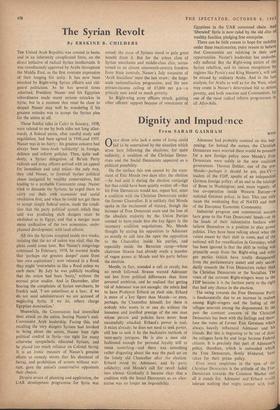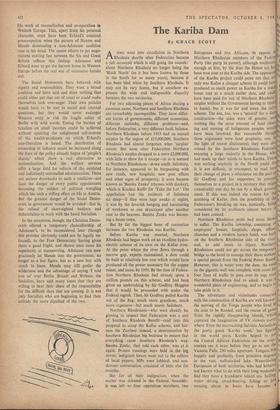Dignity and Impudence
From SARAH GAINHAM noto1 1-1 Nue those who lack a sense of irony could V fail to be entertained by the situation which arose here following the elections; for quite suddenly, a coalition of the Christian Demo- crats and the Social Democrats appeared as a political possibility. • On the surface this was caused by the state- ment of Eric Mende two days after the election —he had said it during the election campaign but that could have been quietly written off—that his Free Democrats would not, repeat /not, enter a coalition with the Christian Democrats under the former Chancellor. It is unlikely that Mende spoke in the excitement of victory, though the increase of Free Democrat seats and the loss of the absolute majority by the Union Parties seemed to have made him the key figure in the necessary coalition negotiations. No, Mende thought by stating his opposition to Adenauer so stoutly to call into the open the opposition to the Chancellor inside his parties, and especially inside the Bavarian camp—whose chairman Strauss had already made a number of vague passes at Mende and his party before the election.
Mende, in fact, sounded a call to revolt; but no revolt followed. Strauss wanted Adenauer out less from political differences than from personal ambition, and he realised that getting rid of Adenauer was not enough: the rebels had to have Professor Erhard on their side. Erhard is more of a key figure than Mende—or even, perhaps, the Chancellor himself; for there is nobody who wants to or can do without the immense and justified prestige of the one man whose person and policies have never been successfully attacked. Erhard's power is real; it exists already; he does not need to seek power, still less to seek it by the backstairs methods of inter-party intrigues. He is also a man old- fashioned enough for personal loyalty still to mean something—and there was something rather disgusting about the way the pack set on the lonely old Chancellor after the election. Erhard stood by Adenauer, and by party solidarity; and Mende's call for revolt faded into silence. Gradually it became clear that a coalition with the Social Democrats as an alter- native was no longer an impossibility. Adenauer had probably counted on this hap- pening; for behind the scenes, the Christian Democrats were worried there would be pressure for a new foreign policy once Mende's Free Democrats were safely in the new coalition government. Thomas Dehler, one of the pre- Mende—perhaps it should be put, pre-TV- leaders of the FDP, speaks of an independent German foreign policy; of an end to the tutelage of Bonn to Washington; and, more vaguely, 0f less co-operation inside Western Europe—a national German policy, in fact. This can only mean the weakening first of NATO and then of the European Economic Community.
Industrial progress and commercial success have gone to the Free Democrats' heads—or 10 the heads of their industrialist backers who believe themselves in a position to play power politics. They have been talking about what the voters meant by their shift in votes, and of the national will for reunification in Germany; what has been ignored is that the shift in voting was primarily away from the Right-wing and refu- gee parties (which have totally disappeared from the parliamentary scene) and only secon- darily towards the Free Democrats rather than the Christian Democrats or the Socialists. The votes of the extreme Right-wingers went to the FDP because it is the furthest party to the right that had any chance in the election.
The swing towards the Free Democrat PartY is fundamentally due to an increase in realism among Right-wingers and the fading of the refugee neurosis among the dispossessed. In the past the constant concern of the Christian Democrats has been with the feelings and there. fore the votes of former East Germans which always heavily influenced Adenauer and his friends. But this is beginning to be out of dale; the refugees have by and large become Federal citizens. It is precisely that part of Adenauer's policy, therefore, which is outmoded which the Free Democrats, firmly blinkered, have taken for their prime policy.
Even more suspicious in the eyes of the Christian Democrats is the attitude of the Free Democrats towards the Common Market and all it stands for. Adenauer and .Erhard would, tolerate nothing that might tamper with their life work of reconciliation and co-operation in Western Europe. This, apart from his personal character, must have been Erhard's constant preoccupation when the picture of Strauss and Mende dominating a non-Adenauer coalition rose in his mind. The recent efforts to get nego- tiations moving fast between the Six and Great Britain reflects this feeling; Adenauer and Erhard want to get the harvest home in Western Europe before the real war of succession breaks out.
The Social Democrats have behaved with dignity and responsibility. They want a broad coalition and have said and done nothing that could either put that out of court or could make themselves look over-eager. Their own policies would have to be met in social and internal questions, but they would never endanger Western unity or risk the fragile safety of Berlin with wild words. Easing the burden of taxation on small incomes could be achieved without upsetting the enlightened self-interest of the wealth-producers on which Erhard's neo-liberalism is based. The distribution of ownership in industry could be increased along the lines of the policy already begun of 'people's shares,' which show a real alternative to nationalisation. And the welfare services offer a large field for reform of the outdated and ludicrously overstaffed administration. There are serious drawbacks to such a coalition—not least the danger of every public appointment becoming the subject of political wangling which has such a stifling effect on life in Austria. But the greatest danger of the Social Demo- crats in government would be avoided—that is, the refusal of short-sighted bankers and industrialists to work with the hated Socialists.
In the meantime, though, the Christian Demo- crats offered a temporary chancellorship of Adenauer's, to be reconsidered later (though this promise obviously could not be legally en- forced), to the Free Democrats; having given them a good fright, and shown once more his superiority at manoeuvring, Adenauer can now graciously let Mende into the government, no longer as a key figure, but as a new boy with much to learn. Mende may still prefer the wilderness and the advantage of saying 'I told you so' over Berlin. Brandt and Wehner, the Socialists, have said many times that they are willing to bear their share of the responsibility for the difficult days that are coming. It is not only Socialists who are beginning to find their attitude the more dignified of the two.















































 Previous page
Previous page